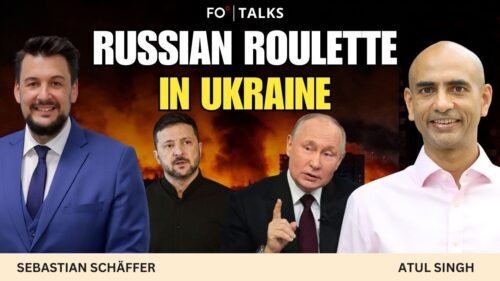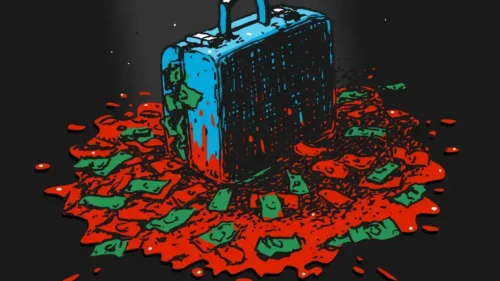After nearly eight years of loyal service, this is my last entry of Fair Observer’s Devil’s Dictionary. The series ends appropriately with the consideration of an expression that reflects our approach to language: “code for.”
When analyzing any form of public discourse, we need to realize that when something is revealed, something else, possibly more significant, may be concealed. The idea of coding has acquired special importance in the digital age. Only recently, just before the revelation of artificial intelligence, youngsters were told to learn to code if they wanted to get a job.
Language is a code of communication. Coding can be direct and simple. We call that kind of coding “informative.” Apparently, it’s also possible to code disinformation and misinformation. In the world of public discourse and legacy journalism, politicians, pundits and reporters sometimes twist the valuable information they provide to hide what they, their party leaders or their editors don’t want us to see.
The summit between US President Donald Trump and Russian President Vladimir Putin that took place in Anchorage, Alaska, earlier this month inspired two seasoned journalists to use the expression “code for” (in one case a verb, in the other a noun) to reveal exactly how that process of concealing unwanted meaning works. The first example comes from author Mansur Mirovalev’s article for the news publication Al Jazeera, bearing the title: “‘Feeding a narcissist:’ Ukraine reflects on Trump-Putin summit.” The author begins by citing what is an undeniable fact:
“Putin said the ‘root causes’ of the war should be addressed before any ceasefire or real steps towards a peace settlement are made.”
It’s a straightforward fact that shouldn’t be difficult for Al Jazeera’s readers to understand. We might even call it common sense. The Russians have repeatedly insisted on returning to the “root causes” or historical context of the conflict. Understanding the motivation of the parties involved is critical to conflict resolution. The website Conflictus helpfully reminds us with this title of its article on the topic: “The First Step in Properly Understanding Conflict: Identifying the Sources.”
But journalists, their editors or employers may feel impelled to do the opposite. Depending on their intent, they may want to present historical reality as an unnecessary distraction. Here is Mirovalev’s gloss on Russia’s demand:
“‘Root causes’ is Putin’s code for rejecting Ukraine’s existence outside Moscow’s political shadow and denying its very sovereignty.”
Now, this is manifestly misleading, if not patently dishonest. His claim that Putin is “rejecting Ukraine’s existence” is unfounded and undocumented; in other words, it is invented. It’s the journalist who’s using the ploy of “code for” to reject out of hand the idea that examining root causes has any validity.
Our second example is an article by East and Central Europe Bureau Chief Andrew Higgins of The New York Times with the title: “Putin Sees Ukraine Through a Lens of Grievance Over Lost Glory.” Another example of assuming without evidence what’s on Putin’s mind.
“President Vladimir V. Putin made clear after his meeting in Alaska with President Trump that his deepest concern is not an end to three and a half years of bloodshed. Rather, it is with what he called the “situation around Ukraine,” code for his standard litany of grievances over Russia’s lost glory.”
Today’s Weekly Devil’s Dictionary definition:
Code for:
A journalistic trope designed to make readers forget what they know about the literal meaning of words and believe a meaning contrary to both the dictionary and common sense.
Contextual note
Far be it from a Devil’s Dictionary to insist that people should trust dictionaries to tell the truth, the whole truth and nothing but the truth. At best, dictionaries list the usual denotative sense of words as they have occurred in both the literary and spoken tradition. Because dictionaries avoid speculating on the theoretically infinite number of contexts in which a word can be used, they cannot account for intentional distortion or rhetorical effects, such as sarcasm, that can quite simply invert the meaning of a word.
In the two cases cited above, we are witnessing a journalistic practice common in an era like our own that encourages and even requires exaggerated propaganda. The trick these two jouranlists have used is to mix with the facts they present a fabricated “insight” claimed to be the result of the journalists’ inside knowledge or superior intellectual authority. They then call this an act of “decoding” or interpreting for the sake of the ignorant.
Why should I criticize that practice? In some sense, that is precisely what a Devil’s Dictionary attempts to do. The difference is that when we assume the identity of the devil, we are announcing an act of studied cleverness, or even perversity. We expect no one will take it seriously or believe that it’s the “true” definition.
But there is another important difference. A Devil’s Dictionary definition is a direct invitation to explore context, investigate ambiguity, dig more deeply into an issue than simply accepting either what the initial quote contained or what the devil’s new definition implies.
Historical note
Ambrose Bierce, the brilliant novelist and journalist who authored the original Devil’s Dictionary, redefined words to satirize the popular political, institutional, social and economic culture of his time. Here is his reflection on the nuclear family in the United States of his era.
“MARRIAGE: The state or condition of a community consisting of a master, a mistress, and two slaves, making in all, two.”
Although this sounds contrary to common sense because of its contestable arithmetic, its absurdity reveals a perception that many married people might acknowledge: that the state of marriage deprives both the husband and wife of the glorious freedom they enjoyed before marriage. Were he writing in today’s age of woke, we can imagine that his editor might oblige him to revise the definition in the following cumbersome way:
“MARRIAGE: The state or condition of a community consisting of a master, a mistress (or two masters and two mistresses), and two slaves, making in all, two.”
After which, his truly woke editor might even tell him to change “two masters and two mistresses” to “two masters and two masteresses” on the grounds that the term mistress is in itself oppressive.
Here’s another of Bierce’s definitions, this time related to his profession of journalism:
“EDITOR: A person who combines the duties of a censor, a copy-reader, a news-gatherer, and a reporter. To the virtues of all these he adds the vices of none.”
I suspect that both journalists mentioned above — Mirovalev and Higgens — might be tempted to agree with Bierce’s definition of their boss. Bierce’s irony suggests that an editor, by combining these diverse and contradictory roles, is, to invert the proverb, the master of all trades and a jack of none, ready to compromise in the name of respecting “superior” constraints. Bierce’s contention that the editor lacks the corresponding vices has the wonderful ironic effect of defining the editor as a soulless, puritanical authority whose business as a censor ensures that the naked truth (God forbid!) will never appear, but rather a carefully sanitized version of it.
Had Mirovalev and Higgens taken seriously their role as journalists, they would at some point have alluded to the importance of understanding “root causes” might have in the context of negotiating the kind of peace treaty Trump and Putin agreed to promote. Rather than claiming to decode it (and change its meaning), they could have done what our Devil’s Dictionary has systematically done throughout its history since 2017. We examine the use not only in its contemporary context, but also further back in history.
The propaganda machine churning away at the core of our legacy media since the Russian invasion of Ukraine in February 2022 has labored at inventing ways to avoid or exclude historical context. The use of the expression “code for” is just one trivial example. Clearly, the best documented ploy has been the endlessly repetitive insistence on labeling the action Putin termed a “Special Military Operation” an “unprovoked full-scale invasion.” That is the official designation that then-US Secretary of State Antony Blinken’s State Department provided, inviting every editor in the legacy media to repeat the adjective “unprovoked” whenever referring to the war in Ukraine. Abolishing history requires a concerted, well-managed effort.
As many, including economist Jeffrey Sachs, Scott Horton (author of Provoked: How Washington Started the New Cold War with Russia and the Catastrophe in Ukraine) and many others have signaled, Blinken’s State Department categorically refused to discuss Putin’s formal request to analyze the root causes at a time when the war could have been avoided, in December 2021. Several months later, the Western allies of Ukraine instructed Ukraine to refuse an already negotiated and initial peace deal based on an examination of the root causes.
That peace deal would have left Ukraine intact, with the question of Crimea to be decided in an undefined future. But then, as now, our authorities and news services are seeking to uproot the very idea of root causes.
*[In the age of Oscar Wilde and Mark Twain, another American wit, the journalist Ambrose Bierce, produced a series of satirical definitions of commonly used terms, throwing light on their hidden meanings in real discourse. Bierce eventually collected and published them as a book, The Devil’s Dictionary, in 1911. We have shamelessly appropriated his title in the interest of continuing his wholesome pedagogical effort to enlighten generations of readers of the news. Read more of The Fair Observer Devil’s Dictionary.]
[Lee Thompson-Kolar edited this piece.]
The views expressed in this article are the author’s own and do not necessarily reflect Fair Observer’s editorial policy.
Support Fair Observer
We rely on your support for our independence, diversity and quality.
For more than 10 years, Fair Observer has been free, fair and independent. No billionaire owns us, no advertisers control us. We are a reader-supported nonprofit. Unlike many other publications, we keep our content free for readers regardless of where they live or whether they can afford to pay. We have no paywalls and no ads.
In the post-truth era of fake news, echo chambers and filter bubbles, we publish a plurality of perspectives from around the world. Anyone can publish with us, but everyone goes through a rigorous editorial process. So, you get fact-checked, well-reasoned content instead of noise.
We publish 3,000+ voices from 90+ countries. We also conduct education and training programs
on subjects ranging from digital media and journalism to writing and critical thinking. This
doesn’t come cheap. Servers, editors, trainers and web developers cost
money.
Please consider supporting us on a regular basis as a recurring donor or a
sustaining member.
Will you support FO’s journalism?
We rely on your support for our independence, diversity and quality.










Comment